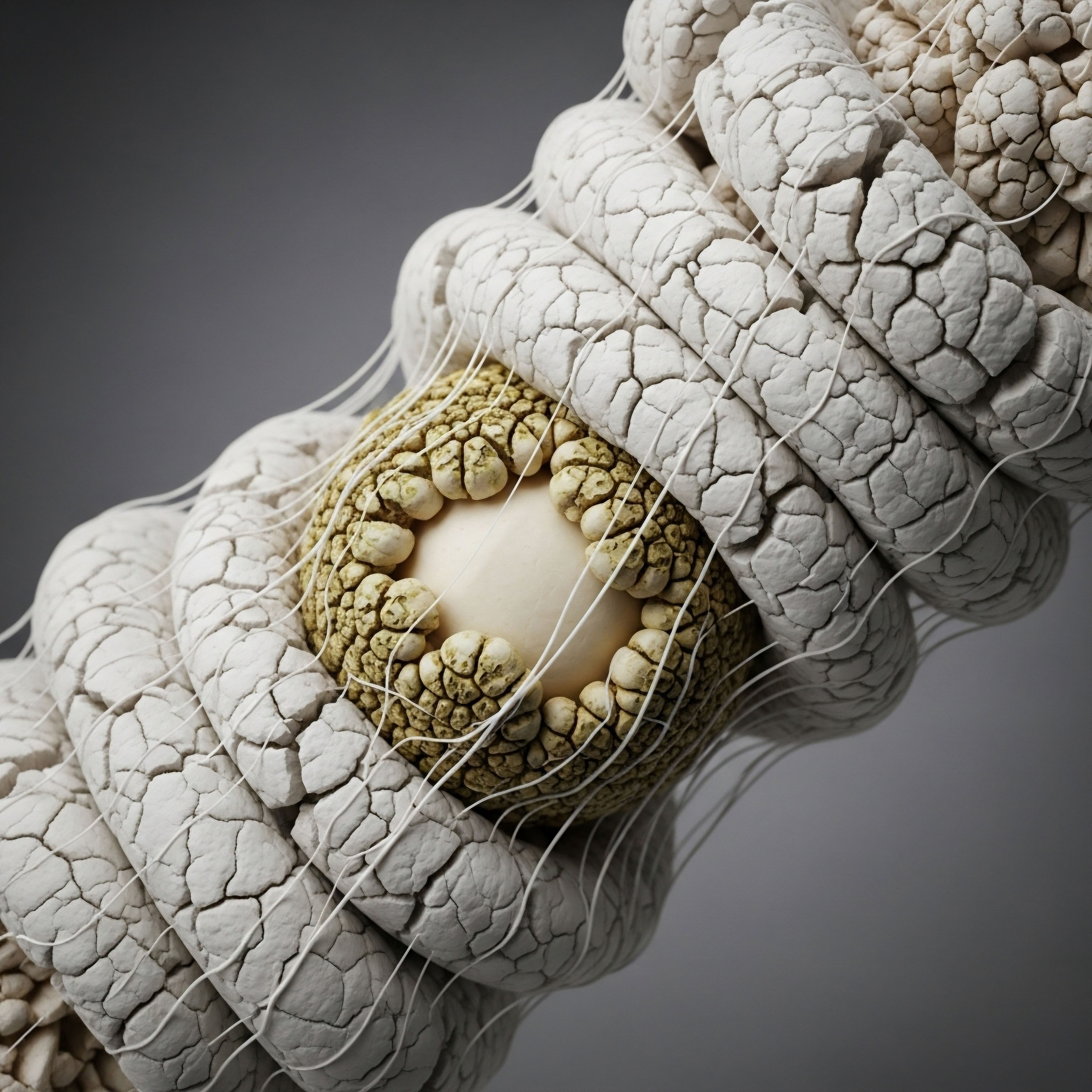

Fundamentals
When you experience persistent fatigue, unexplained weight shifts, or a pervasive sense of mental fogginess, it is natural to seek explanations. These sensations often feel deeply personal, impacting your daily rhythm and overall sense of vitality. Many individuals describe a subtle yet undeniable shift in their well-being, a feeling that their body is no longer operating with its accustomed efficiency.
These symptoms, while common, can signal a deeper conversation occurring within your biological systems, particularly within the intricate network of your endocrine glands.
The endocrine system functions as the body’s internal messaging service, utilizing chemical messengers known as hormones to orchestrate nearly every physiological process. From metabolism and growth to mood and reproductive function, these biochemical signals maintain a delicate balance.
When this balance is disrupted, the effects can ripple throughout your entire system, leading to the very symptoms that prompt a search for answers. A significant component of this system is the thyroid gland, a butterfly-shaped organ located at the base of your neck. This gland produces thyroid hormones, primarily thyroxine (T4) and triiodothyronine (T3), which regulate your metabolic rate, influencing how quickly your body converts food into energy.
Autoimmune thyroid conditions represent a specific type of disruption where the body’s immune system, mistakenly identifies thyroid tissue as foreign. Instead of protecting the body, the immune system launches an attack against its own thyroid cells.
Two prominent examples are Hashimoto’s thyroiditis, which typically leads to an underactive thyroid (hypothyroidism) as the gland is gradually damaged, and Graves’ disease, which results in an overactive thyroid (hyperthyroidism) due to stimulating antibodies. The prevalence of these conditions, particularly Hashimoto’s, is notably higher in women, suggesting a compelling connection to sex hormones.
The body’s internal communication network, the endocrine system, relies on hormones to maintain balance, and disruptions, especially in thyroid function, can manifest as profound shifts in well-being.
Among the various sex hormones, estrogen holds a prominent position, primarily associated with female reproductive health. However, its influence extends far beyond reproductive organs. Estrogen receptors are present on numerous cell types throughout the body, including immune cells and thyroid cells, indicating its widespread regulatory capacity. This broad distribution suggests that fluctuations or imbalances in estrogen levels could have systemic consequences, potentially impacting the immune system’s delicate equilibrium and, by extension, thyroid function.

How Do Hormonal Shifts Impact Thyroid Balance?
The interplay between estrogen and thyroid hormones is a complex biochemical dance. Estrogen can influence thyroid function indirectly by increasing the production of thyroid-binding globulin (TBG), a protein that transports thyroid hormones in the bloodstream. When thyroid hormones are bound to TBG, they are inactive and unavailable for cellular use.
Elevated estrogen levels can lead to an increase in TBG, effectively reducing the amount of free, active thyroid hormone accessible to your cells, even if total thyroid hormone levels appear normal. This phenomenon can contribute to symptoms of an underactive thyroid, even in individuals whose thyroid gland is producing sufficient hormones.
Beyond its indirect effects on thyroid hormone availability, estrogen also exerts direct influence on the immune system. Estrogen is known to modulate immune cell activity, potentially influencing the development and progression of autoimmune conditions. The immune system’s intricate balance of T-helper cells, B-cells, and cytokines can be shifted by varying estrogen concentrations.
This modulation is particularly relevant in autoimmune thyroid conditions, where an aberrant immune response targets the thyroid gland. Understanding this fundamental connection is the first step toward reclaiming optimal health and vitality.


Intermediate
Understanding the foundational connection between estrogen and thyroid health sets the stage for exploring specific clinical protocols designed to restore hormonal equilibrium. The body’s systems are not isolated; they operate in a continuous dialogue, and optimizing one often requires consideration of others. When addressing autoimmune thyroid conditions, particularly in women, the influence of estrogen cannot be overlooked.
The mechanisms by which estrogen impacts the immune system and thyroid function are multifaceted, involving direct cellular interactions and systemic effects on hormone transport.
Estrogen’s influence on the immune system is partly mediated through its interaction with specific receptors, primarily estrogen receptor alpha (ERα) and estrogen receptor beta (ERβ), which are expressed on various immune cells. The balance between these receptor types, along with the concentration and type of estrogen, can determine whether estrogen exerts a pro-inflammatory or anti-inflammatory effect.
For instance, estrogen can stimulate the production of certain immune cells and antibodies, which, in the context of autoimmunity, might contribute to the immune system’s attack on the thyroid. This complex interplay highlights why a personalized approach to hormonal optimization is paramount.

Personalized Hormonal Optimization Protocols
Tailored hormonal optimization protocols aim to recalibrate the endocrine system, moving beyond a simplistic view of hormone replacement to a more holistic strategy. For women experiencing symptoms related to hormonal changes, including those with autoimmune thyroid conditions, a comprehensive assessment of sex hormone levels is a logical starting point. This assessment often includes evaluating estrogen, progesterone, and testosterone levels, alongside thyroid function markers.
One significant aspect of hormonal optimization for women involves Testosterone Replacement Therapy (TRT). While often associated with male health, testosterone plays a vital role in female well-being, influencing energy levels, mood, bone density, and libido. For pre-menopausal, peri-menopausal, and post-menopausal women, low testosterone can contribute to a range of symptoms that may overlap with thyroid dysfunction.
Protocols typically involve low-dose testosterone cypionate, administered weekly via subcutaneous injection, often in amounts ranging from 10 to 20 units (0.1 ∞ 0.2ml). This precise dosing aims to restore physiological levels without inducing supraphysiological effects.
Another critical component is progesterone. Progesterone often acts as a counter-balance to estrogen, and its deficiency can contribute to a state of relative estrogen dominance, even if estrogen levels are not excessively high. Progesterone has been shown to influence thyroid function positively, potentially by decreasing thyroid-binding globulin (TBG) production, thereby increasing the availability of free, active thyroid hormones.
It may also directly influence enzymes involved in thyroid hormone synthesis and metabolism. Progesterone is prescribed based on menopausal status, with various delivery methods available to suit individual needs.
Optimizing hormonal balance, particularly with targeted testosterone and progesterone therapies, can profoundly influence systemic well-being and potentially modulate the immune response affecting thyroid health.
In some cases, particularly when managing estrogen levels, medications like Anastrozole may be considered. Anastrozole is an aromatase inhibitor, meaning it blocks the enzyme aromatase, which converts androgens into estrogen. This can be relevant in situations where estrogen levels are disproportionately high, contributing to symptoms or potentially exacerbating autoimmune processes. While Anastrozole is more commonly used in specific clinical contexts, its role in modulating estrogen levels underscores the intricate relationship between various sex hormones and their systemic impact.
A comprehensive approach to hormonal balance considers the entire endocrine orchestra, recognizing that each hormone influences the others. By carefully adjusting testosterone and progesterone, and in select instances, modulating estrogen conversion, practitioners aim to create an internal environment conducive to optimal thyroid function and immune regulation. This personalized strategy acknowledges the unique biochemical landscape of each individual, striving to restore harmony within the body’s complex communication networks.

How Do Specific Hormonal Therapies Interact with Thyroid Function?
The administration of exogenous hormones, such as those used in TRT or progesterone therapy, requires careful monitoring due to their potential interactions with the thyroid axis. Oral estrogen therapy, for instance, is known to increase levels of TBG, which can necessitate an adjustment in thyroid hormone replacement dosage for individuals with hypothyroidism. Transdermal estrogen, by contrast, generally has less impact on TBG levels. This distinction highlights the importance of the delivery method in hormonal therapy.
Considerations for hormonal optimization protocols in the context of autoimmune thyroid conditions:
- Testosterone Cypionate ∞ For women, low-dose subcutaneous injections aim to restore physiological testosterone levels, which can improve energy, mood, and metabolic markers. While not directly targeting thyroid autoimmunity, systemic metabolic improvements can indirectly support overall endocrine health.
- Progesterone ∞ Administered based on individual needs, progesterone can help balance estrogen’s effects, potentially reducing TBG and increasing free thyroid hormone availability. This can be particularly beneficial in cases of estrogen dominance.
- Anastrozole ∞ In specific scenarios where estrogen conversion is a concern, Anastrozole may be used to reduce circulating estrogen levels. Its impact on thyroid function is generally considered minimal, but individual responses vary.
The goal is always to achieve a state of biochemical recalibration, where all hormonal systems operate synergistically. This involves regular laboratory monitoring of thyroid hormones (TSH, free T3, free T4), sex hormones (estradiol, progesterone, total and free testosterone), and relevant markers of immune function. Adjustments to therapy are made iteratively, guided by both objective lab data and the individual’s subjective experience of symptom resolution and improved vitality.
| Hormone | Primary Mechanism of Thyroid Influence | Potential Impact on Autoimmunity |
|---|---|---|
| Estrogen | Increases Thyroid-Binding Globulin (TBG), reducing free thyroid hormone availability; modulates immune cell activity (ERα/ERβ). | Can influence immune cell differentiation and antibody production, potentially exacerbating autoimmune responses in some contexts. |
| Progesterone | Decreases TBG production, increasing free thyroid hormone availability; direct effects on thyroid hormone activity and synthesis enzymes. | May have immune-modulating effects, potentially balancing estrogen’s influence and supporting a less inflammatory immune profile. |
| Testosterone | Indirect systemic metabolic effects; influences immune cell balance (e.g. Th1/Th2). | Generally considered immune-suppressive or balancing, potentially mitigating pro-inflammatory autoimmune tendencies. |


Academic
The sophisticated interplay between estrogen and autoimmune thyroid conditions extends to the molecular and cellular levels, revealing a complex regulatory network that underpins systemic health. A deeper understanding of these mechanisms is essential for developing highly targeted and effective personalized wellness protocols. The female predominance in autoimmune thyroid diseases, such as Hashimoto’s thyroiditis and Graves’ disease, strongly implicates sex hormones, particularly estrogen, as significant modulators of immune function.
Estrogen’s impact on the immune system is not monolithic; it depends on various factors, including the specific estrogen receptor subtypes involved, the tissue context, the concentration of estrogen, and its ratio to other sex hormones.
The two primary estrogen receptors, estrogen receptor alpha (ERα) and estrogen receptor beta (ERβ), are widely expressed on immune cells, including T lymphocytes, B lymphocytes, macrophages, and dendritic cells. These receptors mediate estrogen’s genomic effects by regulating gene expression, and also non-genomic effects through rapid signaling pathways.

Molecular Mechanisms of Estrogen-Immune Interaction
ERα activation is often associated with proliferative and pro-inflammatory effects, while ERβ activation tends to be more anti-proliferative and anti-inflammatory. In the context of autoimmunity, an imbalance favoring ERα signaling or an overall heightened estrogenic state can potentially contribute to immune dysregulation.
For example, estrogen can stimulate the production of Th2-lymphocytes, which in turn promote the production of antibodies by B-cells. In autoimmune thyroid conditions, this can lead to an increased generation of autoantibodies, such as anti-thyroid peroxidase (anti-TPO) and anti-thyroglobulin (anti-TG) antibodies, which target and damage thyroid tissue.
Beyond direct immune cell modulation, estrogen influences inflammatory pathways. It can affect the production of cytokines, which are signaling molecules that regulate immune responses. Elevated estrogen levels have been linked to increased levels of pro-inflammatory cytokines like interleukin-6 (IL-6), which can shift the immune balance towards a more inflammatory state.
This inflammatory milieu can perpetuate the autoimmune attack on the thyroid gland. Furthermore, the liver’s ability to metabolize and clear estrogen can be compromised in hypothyroidism, creating a feedback loop where impaired thyroid function leads to higher circulating estrogen levels, potentially exacerbating the autoimmune process.
Estrogen’s complex interaction with immune cell receptors and inflammatory pathways at the molecular level significantly influences the trajectory of autoimmune thyroid conditions.

Interconnectedness of Endocrine Axes
The endocrine system operates as a series of interconnected axes, and a disruption in one can cascade to others. The Hypothalamic-Pituitary-Gonadal (HPG) axis, which regulates sex hormone production, is intimately linked with the Hypothalamic-Pituitary-Thyroid (HPT) axis, which controls thyroid function. For instance, imbalances in sex hormones can influence the sensitivity of the pituitary gland to thyroid-releasing hormone (TRH) from the hypothalamus, or thyroid-stimulating hormone (TSH) from the pituitary.
Clinical observations support this interconnectedness. Women with polycystic ovary syndrome (PCOS), a condition characterized by hormonal imbalances including often elevated androgen levels and relative estrogen dominance, exhibit a higher prevalence of subclinical hypothyroidism and Hashimoto’s thyroiditis. This correlation underscores how systemic hormonal dysregulation can predispose individuals to autoimmune thyroid conditions.
The concept of estrogen dominance, where estrogen levels are disproportionately high relative to progesterone, is particularly relevant. This state can arise from various factors, including environmental exposures to xenoestrogens, impaired liver detoxification, or insufficient progesterone production. In estrogen dominance, the increased TBG production can reduce free thyroid hormone, leading to hypothyroid symptoms even with normal TSH.
Moreover, this hormonal imbalance can directly influence the immune system, potentially promoting a Th1-dominant immune response, which is often implicated in autoimmune conditions like Hashimoto’s.

Therapeutic Implications and Systems Biology
From a systems-biology perspective, addressing autoimmune thyroid conditions requires a comprehensive strategy that considers not only thyroid hormone replacement but also the broader hormonal and metabolic landscape. Personalized protocols aim to restore optimal sex hormone balance, which can, in turn, modulate immune function and support thyroid health.
Key considerations in a systems-based approach:
- Estrogen Metabolism Optimization ∞ Supporting liver detoxification pathways is crucial for proper estrogen clearance. This involves nutritional strategies and potentially targeted supplements that aid phase I and phase II detoxification.
- Progesterone Recalibration ∞ Ensuring adequate progesterone levels can help counter the effects of estrogen, reducing TBG and promoting a more balanced immune response. This is often achieved through bioidentical progesterone therapy.
- Testosterone Balance ∞ For women, optimizing testosterone levels can improve overall metabolic health and energy, indirectly supporting systemic resilience against autoimmune triggers.
- Inflammation Modulation ∞ Strategies to reduce systemic inflammation, such as dietary modifications, gut health optimization, and targeted anti-inflammatory agents, can create a less hostile environment for the thyroid gland.
While the primary treatment for hypothyroidism in Hashimoto’s is thyroid hormone replacement, such as levothyroxine, managing the underlying autoimmune process and hormonal influences can significantly improve patient outcomes and quality of life. The goal is to move beyond merely treating symptoms to addressing the root causes of hormonal and immune dysregulation.
| Estrogen Receptor (ER) Type | Primary Immune Cell Expression | General Effect on Immune Response |
|---|---|---|
| ERα | CD4+ T cells, B cells, macrophages | Often associated with pro-inflammatory, proliferative effects; can promote Th2 responses and antibody production. |
| ERβ | B cells, CD8+ T cells, dendritic cells | Generally associated with anti-inflammatory, suppressive effects; can promote Treg differentiation. |
The nuanced understanding of estrogen’s role in autoimmune thyroid conditions underscores the importance of a precision medicine approach. By analyzing individual hormonal profiles, genetic predispositions, and lifestyle factors, clinicians can tailor interventions that restore not just hormonal numbers, but the fundamental physiological harmony necessary for vibrant health. This deep dive into the biochemical intricacies empowers individuals to become active participants in their health journey, understanding the ‘why’ behind their symptoms and the ‘how’ of their personalized solutions.

References
- Pecnik, P. Promberger, R. & Ott, J. The Influence of Female Health Issues on the Development of Autoimmune Thyroid Disease. Journal of Clinical & Translational Endocrinology, 2020.
- Wentz, I. Estrogen Dominance as Hashimoto’s Trigger. Dr. Izabella Wentz, PharmD, FASCP, 2018.
- Sathi, P. Kalyan, S. Hitchcock, C. L. Pudek, M. & Prior, J. C. Progesterone therapy increases free thyroxine levels ∞ data from a randomized placebo-controlled 12-week hot flush trial. Clinical Endocrinology, 2013.
- Ablin, R. J. Penhale, W. J. & Talal, N. Sex hormones, immune responses, and autoimmune diseases. Mechanisms of sex hormone action. Clinical Immunology and Immunopathology, 1991.
- Ahmed, S. A. & Penhale, W. J. The influence of testosterone on the development of autoimmune thyroiditis in thymectomized and irradiated rats. Clinical Immunology and Immunopathology, 1988.
- Lazzereschi, M. et al. Sex hormones levels and chronic autoimmune thyroiditis in a cohort of obese male patients. European Thyroid Association, 2022.
- Derwahl, M. & Manole, D. Estrogen and its role in thyroid cancer. Endocrine-Related Cancer, 2014.
- Manole, D. et al. Estrogen receptor alpha and beta expression in human thyroid tissue. Thyroid, 2001.
- Ansar Ahmed, S. Sex hormones, immune responses, and autoimmune diseases. Mechanisms of sex hormone action. Clinical Immunology and Immunopathology, 1991.
- Pecnik, P. Promberger, R. & Ott, J. The Influence of Female Health Issues on the Development of Autoimmune Thyroid Disease. Journal of Clinical & Translational Endocrinology, 2020.

Reflection
As you consider the intricate connections between estrogen therapy and autoimmune thyroid conditions, a deeper appreciation for your body’s inherent wisdom begins to take shape. This exploration is not merely about understanding scientific facts; it is about recognizing the profound dialogue occurring within your own biological systems. The symptoms you experience are not random occurrences; they are messages, signals from an internal landscape seeking balance.
This knowledge empowers you to approach your health journey with renewed clarity. It invites you to move beyond a fragmented view of symptoms and instead, to consider the interconnectedness of your endocrine, immune, and metabolic functions. Your path to reclaiming vitality is deeply personal, requiring a tailored approach that respects your unique physiology. The insights gained here serve as a compass, guiding you toward a more informed and proactive partnership with your healthcare team.
Understanding how hormonal recalibration can influence systemic well-being is a powerful step. It encourages a shift from passive observation to active participation in your health narrative. The journey toward optimal function is continuous, marked by ongoing learning and thoughtful adjustments. May this information serve as a catalyst for your personal transformation, enabling you to live with greater energy, mental clarity, and a profound sense of well-being.



